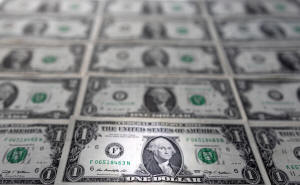U.S. dollar posts largest weekly gain in one month on hawkish Fed
messages
 Send a link to a friend
Send a link to a friend
 [April 09, 2022] By
Gertrude Chavez-Dreyfuss [April 09, 2022] By
Gertrude Chavez-Dreyfuss
NEW YORK (Reuters) - The U.S. dollar index
on Friday posted its largest weekly percentage gain in a month,
supported by the prospect of a more aggressive pace of Federal Reserve
tightening to curb soaring inflation.
The index also advanced to 100 for the first time in nearly two years.
It rose as high as 100.19, its highest since May 2020. It was last
little changed on the day at 99.822, and up 1.3% on the week.
The greenback gained ground against a basket of six currencies over the
past month, particularly versus the euro, which has been pressured by
investor concerns about the economic costs of war in Ukraine and a
potentially nail-biting presidential election in France.
Jonas Goltermann, senior markets economist at Capital Economics, said
that "the Fed's hawkish message on quantitative tightening, renewed
sanction risks in Europe and the polling shift in favor of far-right
candidate Marine Le Pen ahead of France's presidential election has put
pressure on risk sentiment, especially in Europe."

This week's release of the minutes of the Fed's March meeting showed
"many" participants were prepared to raise rates in 50-basis-point
increments in coming months.
On the other side of the dollar's rally, the euro dropped to a one-month
low of $1.0837. It last changed hands at $1.0853, down 0.3% on the day.
The euro has fallen in seven straight sessions.
Meeting minutes from the European Central Bank published on Thursday
suggested its policymakers are keen to act to combat inflation, but the
euro zone has so far taken a more cautious tack than other central
banks, weakening the euro.
[to top of second column] |

U.S. dollar banknotes are displayed in this illustration taken,
February 14, 2022. REUTERS/Dado Ruvic//

"ECB minutes presented little in contrast to recent comments by policymakers,
though the sense is that the bank is merely awaiting data over the coming months
showing the impact of higher energy prices and the war in Ukraine to decide when
to hike first - whether it's in Q3 or Q4," wrote Shaun Osborne, chief FX
strategist, at Scotiabank in Toronto, in a research note. "In either scenario,
we don't anticipate more than 50 basis points in tightening from the ECB this
year, which is only as much as the Fed is set to roll out in one meeting, next
month."
A tightening election race in France between President Emmanuel Macron and
far-right candidate Le Pen has added pressure on the euro, raising investor
concerns about the future direction of the euro zone's second-biggest economy.
Macron is still ahead in polls.
The dollar rose against the Japanese yen, hitting 124.67 yen, its highest in
over a week and approaching last month's near seven-year high of 125.1. It was
last up 0.3% at 124.355 and 1.5% higher on the week.
The yen has steadied this month after tumbling in March, but remains under
pressure as the U.S. raises interest rates and the Bank of Japan intervenes in
the bond market to keep rates low.
Sterling lost ground versus the dollar, and was last down 0.3% at $1.3035.
(Reporting by Gertrude Chavez-Dreyfuss; Additional reporting by Iain Withers in
London and Alun John in Hong Kong; Editing by Bradley Perrett, Chizu Nomiyama,
Will Dunham and John Stonestreet)
[© 2022 Thomson Reuters. All rights
reserved.]This material may not be published,
broadcast, rewritten or redistributed.
Thompson Reuters is solely responsible for this content. |